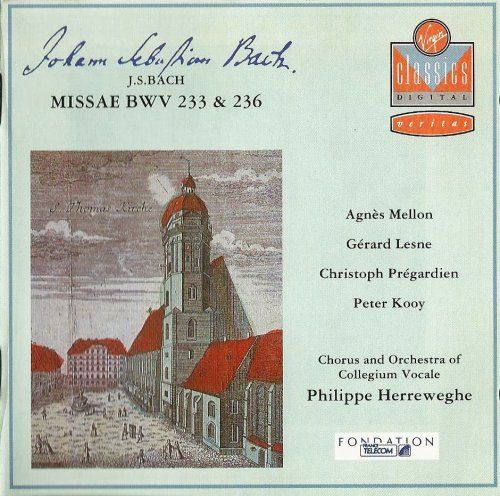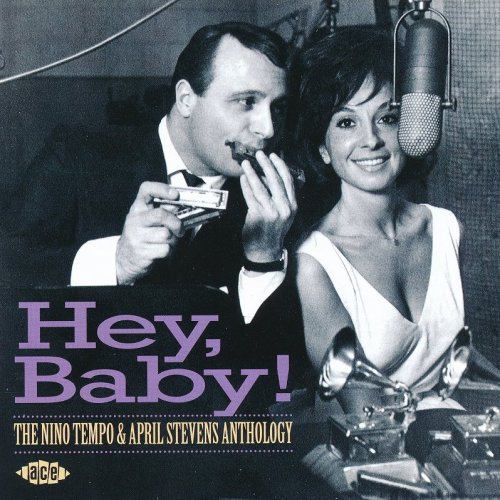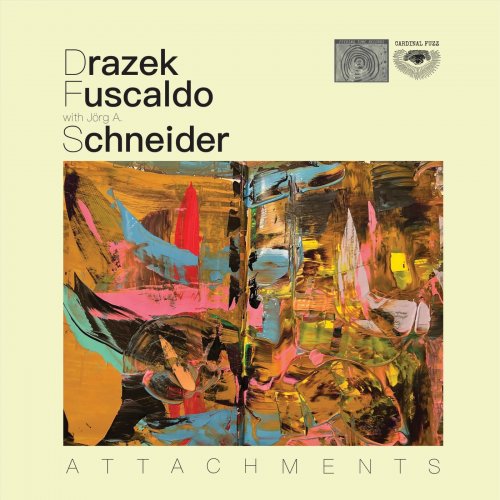Philippe Herreweghe - J.S. Bach: Missae BWV 233 & 236 (1991)

Artist: Philippe Herreweghe
Title: J.S. Bach: Missae BWV 233 & 236
Year Of Release: 1991
Label: Virgin Classics
Genre: Classical
Quality: FLAC (image+.cue,log,scans)
Total Time: 55:22
Total Size: 267 Mb
WebSite: Album Preview
Tracklist: Title: J.S. Bach: Missae BWV 233 & 236
Year Of Release: 1991
Label: Virgin Classics
Genre: Classical
Quality: FLAC (image+.cue,log,scans)
Total Time: 55:22
Total Size: 267 Mb
WebSite: Album Preview
01. Mass for in F major, BWV 233: Kyrie [0:05:16.60]
02. Mass for in F major, BWV 233: Gloria in excelsis Deo [0:05:33.48]
03. Mass for in F major, BWV 233: Domine Deus [0:03:32.65]
04. Mass for in F major, BWV 233: Qui tollis peccata mundi [0:05:21.62]
05. Mass for in F major, BWV 233: Quoniam tu solus Sanctus [0:04:58.00]
06. Mass for in F major, BWV 233: Cum Sancto Spiritu [0:02:35.15]
07. Mass in G major, BWV 236: Kyrie [0:04:14.08]
08. Mass in G major, BWV 236: Gloria in excelsis Deo [0:04:51.30]
09. Mass in G major, BWV 236: Gratias agimus tibi [0:05:08.20]
10. Mass in G major, BWV 236: Domine Deus [0:04:47.10]
11. Mass in G major, BWV 236: Quoniam tu solus Sanctus [0:04:59.20]
12. Mass in G major, BWV 236: Cum Sancto Spiritu [0:04:08.42]
Performers:
Agnès Mellon - soprano
Gérard Lesne - contralto
Christoph Prégardien - tenor
Peter Kooy - bass
Collegium Vocale Gent
Orchestra of Collegium Vocale Gent [on period instruments]
Philippe Herreweghe – conductor
This is the companion CD to Herreweghe's recording of the Masses in A major and G minor (CD VC7 91118-2, 1/91), and it means that at last Bach's four short Masses are available in recordings that do them justice. Justice is what they deserve, too, because thanks to Bach's extensive plundering of earlier works for these settings of the Kyrie and Gloria (the only sections of the Mass required by Lutheran usage) they have come to represent one of the least valued groups of pieces in the composer's entire output. The fact that the B minor Mass and the Christmas Oratorio recycle old material in exactly the same way seems to have made no impression on the generations of Bach scholars—and, it seems, Bach performers—who have turned up their noses at these delightful works, which in every way are thoroughly characteristic of their composer.
The Masses on this disc—those in F major and G major—were not recorded at the same time as the other two, but they were done in the same place with exactly the same forces, and much of what I said in my review of the earlier disc therefore applies this time round as well. The acoustic of the Abbaye aux Dames in Saintes is a reverberant one, even by the standards of those Herreweghe habitually favours, and it offers him considerable assistance in his customary pursuit of a mellow and smoothly blended sound. No doubt, too, it encourages his laid-back and, for these days, generally rather expansive approach; but although a typically attractive performance is the result, it seems on this occasion to be at a high price in immediacy in the solos and textural clarity in the choral movements. There is still a lot to enjoy, however, including some fine singing from all four soloists, a good oboist and, of course, some lovely music: try the masterful counterpoint of the F major's Kyrie, or the dancing soprano and alto lines which open the Gloria of the G major—thrillingly adapted from the horn parts of its model in Cantata No. 79.
The Masses on this disc—those in F major and G major—were not recorded at the same time as the other two, but they were done in the same place with exactly the same forces, and much of what I said in my review of the earlier disc therefore applies this time round as well. The acoustic of the Abbaye aux Dames in Saintes is a reverberant one, even by the standards of those Herreweghe habitually favours, and it offers him considerable assistance in his customary pursuit of a mellow and smoothly blended sound. No doubt, too, it encourages his laid-back and, for these days, generally rather expansive approach; but although a typically attractive performance is the result, it seems on this occasion to be at a high price in immediacy in the solos and textural clarity in the choral movements. There is still a lot to enjoy, however, including some fine singing from all four soloists, a good oboist and, of course, some lovely music: try the masterful counterpoint of the F major's Kyrie, or the dancing soprano and alto lines which open the Gloria of the G major—thrillingly adapted from the horn parts of its model in Cantata No. 79.

![Clifton Chenier - The King of Zydeco (Live) (1981) [Hi-Res] Clifton Chenier - The King of Zydeco (Live) (1981) [Hi-Res]](https://img.israbox.com/img/2025-12/20/xjfs68k4k2e6nw8a1vz89ft6c.jpg)






